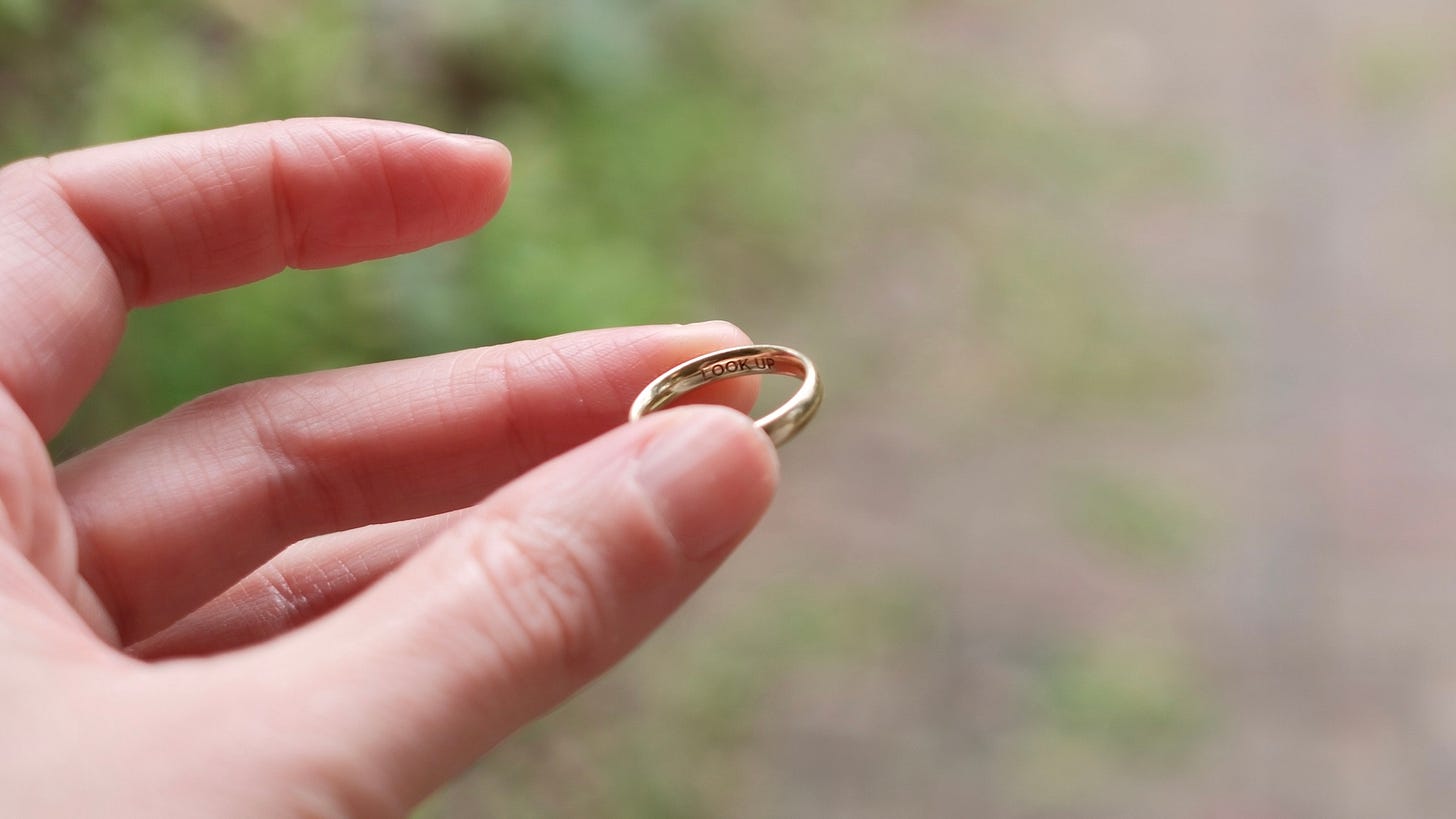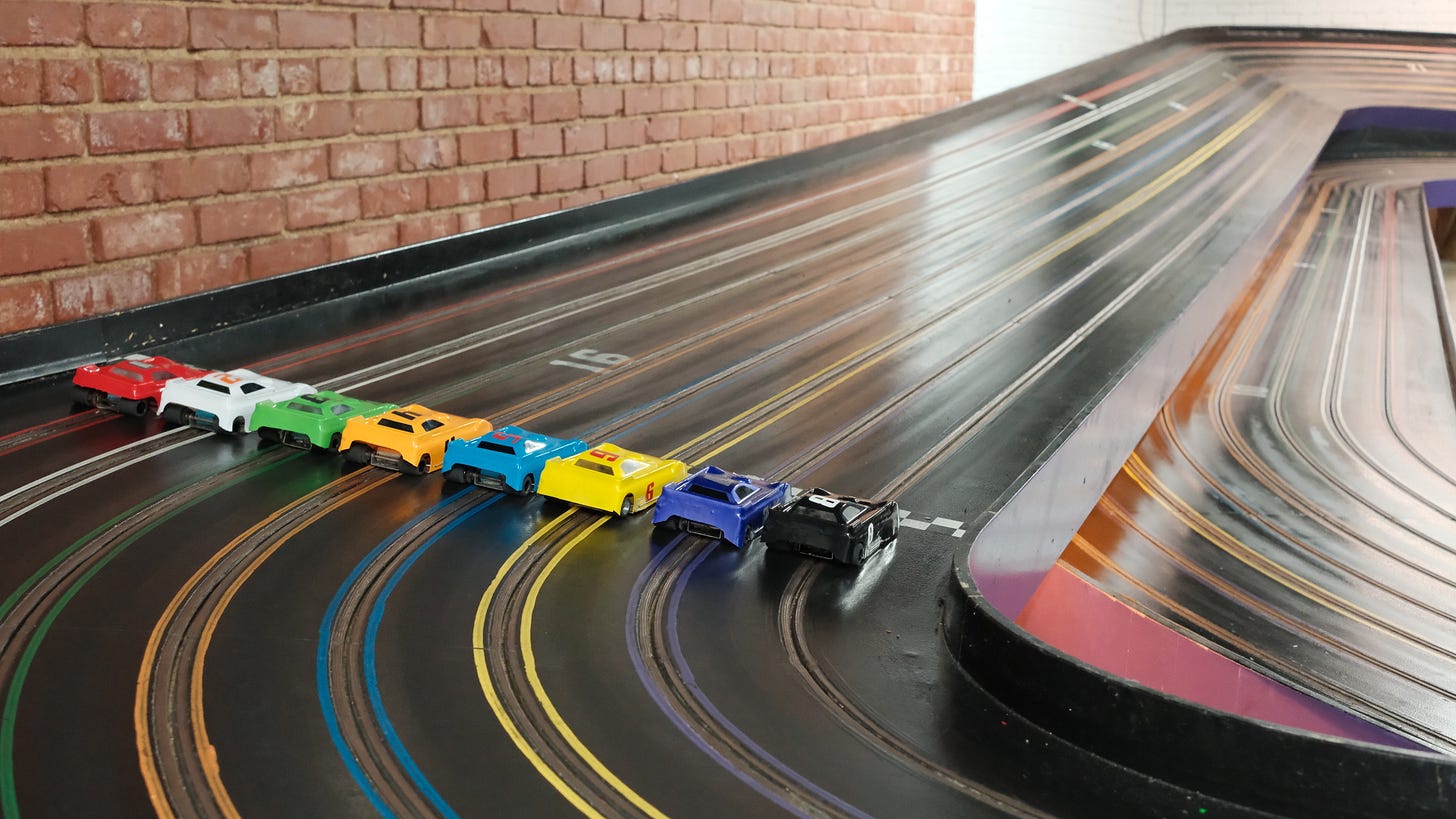Monday Miscellany: Looking for cool bugs and spiders
Notes from August 4 - 10
It’s another overcast and drizzly evening here in North Carolina, but I’m in a good mood coming off of a week filled with adventure: a quick trip to Virginia, a cookout at our house despite the rain, a Halloween browse with a friend at HomeGoods, a chaotic birthday party with family, and a bit of D&D to round it out. How are things where you are? I hope today has been kind so far and that you have something fun or relaxing to look forward to.
Read this week
Somewhat ironically, I finished Greyhound by Joanna Pocock1 in the car as Jordan drove us to Richmond on Wednesday. It’s a memoir about two bus trips across the United States, the first to process the author’s grief on the heels of a miscarriage and a sibling’s death back in 2006, the other a 2023 reprise of the original journey and an investigation into everything that had changed in the years between. Pocock documents the minutiae of her journeys, of course, in a timeless style that reminded me of Patti Smith’s memoirs, but she also writes about the history of the places she passes through and the negative impact human beings have had on the land. I thought several times of Jenn Shapland’s Thin Skin, especially when Pocock details the presence of toxins in the earth, air, and water following train derailments and around nuclear weapon testing sites. It isn’t cheery reading, but it’s important.
In its melancholy wake, Greyhound has me mulling over the ways technological “advancements” often decrease human contact and camaraderie and make accessing necessary services and resources much harder for people already living in poverty.2 I like to joke about being an introvert and preferring to avoid contact with other people, but this book reminded me how much I actually do crave those small interactions with strangers, the reassuring sense that even if our bus breaks down on the side of the highway, we’re all in this together.
These moments are real. They cannot be digitized or appified. They are lodged in time and space. They are only given to us outside the sphere of the machine and if we try and hold on to them, they dissolve. (262-263)
There’s so more I want to say about where Pocock took me and what she made me think about, but to sum it up: I was transported, challenged, taught, made to grieve, and finally, encouraged to hope.
There are people laughing and there are human connections being made outside the digital world, in the world of the senses. It is these things that matter. The stars exist just where they should, all around the ‘more than sufficient Earth’ that Walt Whitman conjured. When life conspires to bring you to a patch of land under a trail of stars in our more than perfect sky, look up. Look up and keep looking up until you can’t any longer. (346)
Our Richmond trip was a quick one; we were just in town for a night to see a Mountain Goats show at the Broadberry, and we didn’t stop at any bookstores this time. But making eyes at Shelf Life Books across Cary Street as I sipped a latte at Sugar & Twine reminded me that I hadn’t yet read my most recent acquisition from our last browse there, a used copy of Rental House by Weike Wang, so that‘s what I picked up next.
Where Greyhound journeys nearly across the entire United States, Rental House is notably stationary, examining a married couple in two different vacation homes, first during the pandemic and then several years later. There are visitors both times, so we get to know not only protagonists Keru and Nate but also both of their sets of parents and Nate’s brother Ethan. With no real plot to speak of, the novel is an extended character study that digs into the ways these people relate to each other. Keru’s parents are Chinese immigrants while Ethan comes from a working-class white Republican family, and the young couple has decided not to have kids—the dynamics here are complicated and the relationships fraught.
Home is not a given and, for many, a hard, sometimes impossible place to find. (111)
This is a quick read yet quite meaty, occasionally bleak but also relatable, and through contrast it made me really grateful for my person and the life we’ve built together.
Last night I finished another novel set largely in a single house, in this case an old family estate in Mexico.3 Fonseca by Jessica Francis Kane4 is historical fiction based on the real life of writer Penelope Fitzgerald, imagining in more detail a trip she took with her young son Valpy in 1952 to try and win the legacy of two elderly distant relatives. I was initially drawn to the book because I’d read and enjoyed Kane’s previous one, Rules for Visiting, and though this one is much different in content and tone, I loved it.
Penelope and Valpy stay at Fonseca for several months, having drinks and meals and conversations with the sisters-in-law who own the estate, Anita and Elena, their staff, and various other guests. The group scenes, everyone sipping cocktails, gossiping, and presenting ideas in the drawing room, feel very Jane Austen. Valpy and Penelope develop friendships with other visitors, including painter Edward Hopper and his wife, Jo, and they do a bit of exploring in town, but overall it’s a quiet novel, largely focused on Penelope’s interior landscape. She’s been dealing with an alcoholic husband and a floundering literary magazine at home, her family’s on the cusp of financial danger, she’s just found out she’s pregnant with a third child, and now she’s maybe falling in love with someone she’s met at Fonseca? This world was such an enjoyable one to get lost in for a few days, and now I’m greatly looking forward to reading some of the real Penelope Fitzgerald’s work.
If you purchase a book through the bookshop.org affiliate links in this post, I may earn a small percentage commission. This is an easy way to support my work at no additional cost, and I appreciate it very much—thank you! ♥︎
Haiku round-up
Haiku is a poetic form that originated in Japan, containing seventeen syllables in a five-seven-five pattern. At the beginning of 2024, I started writing one every day, and while traditional examples include thematic reference to the seasons, mine tend to be a bit more all over the place. Here are this week’s efforts—enjoy!
Monday, August 4
Homework is finished Laptop and front door slam shut Time to play outside
Tuesday, August 5
A stranger leans in, his cigarette, catching, glows Quiet gratitude
Wednesday, August 6
The opening chords of an unexpected song Uh-oh, I’m crying
Thursday, August 7
Fresh watermelon, epitome of summer a sweet, juicy crunch
Friday, August 8
Together we form a hype crew of petty hate, ranting and laughing
Saturday, August 9
Catching sight of me, your pace quickens and a smile cracks your face open
Sunday, August 10
Night air filters in carrying cicada song and wispy moonlight
And another thing
On Saturday I experienced slot car racing for the first time at our 6-year-old nephew’s birthday party. The concept is pretty simple—miniature cars fit into slots and are powered by remote controls—but apparently people go all out building custom cars and tracks. I raced for a little while at the end of the party, but for the most part I was stationed beside one of the sharpest curves, putting cars back into their grooves when the kids flung them out by taking the turn too quickly. It was extremely chaotic and a lot of fun.
The unexpected song in Wednesday’s haiku above was “Woke Up New” at the Mountain Goats show, an all-time favorite that I haven’t seen them play live in a long time. It so perfectly captures the feeling of being alone (“I wandered through the house like a little boy lost at the mall, and an astronaut could’ve seen the hunger in my eyes from space”) and completely unmoored by someone’s absence (“the first time I made coffee for just myself, I made too much of it, but I drank it all just ‘cause you hate it when I let things go to waste”), and it has the simplest and most plaintive chorus ever (“and I sang oh, what do I do, what do I do, what do I do? What do I do without you?”). Here it is if you want to
crylisten.Like a lot of people, I’m on a constant quest to use my phone more intentionally and stop letting it suck my life away. Here’s an excellent list of ways to curb usage, and if you want to dive deeper into the subject, I can highly recommend Catherine Price’s book How to Break Up With Your Phone. (Here’s a post I wrote about it a couple years ago):
Until next time
After the birthday party on Saturday, I spent a few hours at my brother’s house, watching our older nephew build a Hot Wheels track with my dad, playing with our younger one on the backyard swingset, giving Piper the cat some good scritches, and generally just hanging around. Before leaving, we posed for some family photos, and seeing my fancy camera come out had the older nephew begging to take some pictures himself. With wrist strap securely in place, I let him go for it. His captures were pretty decent! I especially love this one of my brother and me—we were wandering among his plants, idly chatting and looking for cool bugs and spiders. If we ever form a band, maybe we’ll use it as our album cover.
See you next Monday, and until then, if actions speak louder than words, THIS is a yell.5
♥︎ Emily
Thank you to Soft Skull Press for sending me a finished copy—Greyhound releases tomorrow, August 12.
Specifically, Pocock talks a lot about (lack of) walkability in urban areas surrounding bus stations and other transportation hubs, increasing reliance on smartphone apps and digital ticketing, the prevalence of cashless establishments, and the decreasing amount of physical shelter for people awaiting buses. “Everything is stacked against you,” she writes, “unless you have a car, a full tank of gas, an iPhone, and a credit card linked to an array of apps to keep all your devices and vehicles lubricated, with data, oil, and money.” (281)
If I may: I am KILLING it with the segues today.
Thank you to Penguin Press for this one, which also releases tomorrow.
This reel is on the longer side but very much worth a watch, especially if you’re a fan of the 2005 Pride and Prejudice adaptation.






